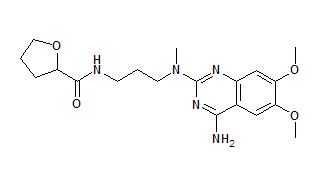Sanofi-Synthelabo announced today that its New Drug Application (NDA) for alfuzosin HCl extended-release tablets has been approved in the United States by the Food and Drug Administration (FDA).
Alfuzosin is indicated for the treatment of the signs and symptoms of benign prostatic hyperplasia.
Alfuzosin, a compound from Sanofi-Synthelabo Research, is an alpha1-blocker in a 10 mg once-daily extended-release formulation.
Alfuzosin exhibits selectivity for alpha1-adrenergic receptors in the lower urinary tract. Blockade of these adrenoreceptors can cause smooth muscle in the bladder neck and prostate to relax, resulting in an improvement in urine flow and a reduction in symptoms of benign prostatic hyperplasia (BPH).
BPH is a very common disorder, leading to urinary symptoms of varying severity. The resulting symptoms affect 22% of men aged 50-59 years, but up to 45% of men aged 70-80 years. These symptoms may have an impact on men's day-to-day activities and may lead
to serious complications such as acute urinary retention. Clinical efficacy data for alfuzosin from placebo-controlled trials have demonstrated efficacy compared to placebo in urinary flow improvement and in improvement in urinary symptoms without the need for dose titration.
In the clinical trials, the most common side effects occurring more frequently than placebo were dizziness, upper respiratory tract infection, headache and fatigue.
Alfuzosin should not be used in patients with moderate to severe hepatic insufficiency. Alfuzosin should not be co-administrated with potent inhibitors of the cytochrome P3A4. As with other alpha-blockers, some patients may experience postural hypotension or syncope. Alfuzosin should not be used in combination with other alpha-blockers. If symptoms of angina pectoris should appear or worsen, the use of alfuzosin should be discontinued. Caution should be exercised when alfuzosin is administered in patients with severe renal insufficiency. Consideration
should be given in deciding to prescribe alfuzosin for patients with a known QT prolongation or who are taking medications known to prolong QT, although there has been no signal of Torsades de Pointes in extensive postmarketing experience with alfuzosin outside the United States. There are no known PK/PD studies of the effects of other alpha-blockers on cardiac repolarization.
With 15 years of clinical experience, which translates into approximately 1.35 billion days of treatment (3.7 million patient years), alfuzosin is marketed in more than 80 countries throughout Europe, Latin America, Africa and Asia. Outside of the United States, the once-daily formulation (Xatral(R) OD) is registered in 70 countries worldwide; it is currently marketed in 14 countries in Europe and in more than 35 other countries.
The launch of alfuzosin HCl extended-release tablets in the United States will occur in the second half of 2003.
Sales of alfuzosin reached 182 million euros in 2002 and 49 million
euros in the first quarter of 2003.
Sanofi-Synthelabo is a major global research-based pharmaceutical group with 32,500 employees in more than 100 countries. The company is headquartered in Paris and listed in Paris (Euronext: SAN) and in New York. With consolidated sales of EUR 7.4 billion in 2002, Sanofi-Synthelabo ranks 7th in Europe and among the world's top 20 pharmaceutical companies. With an R&D portfolio of 52 compounds in development, Sanofi-Synthelabo is focused on a core group of four therapeutic areas: cardiovascular disease and thrombosis; diseases of the central nervous system; internal medicine; and oncology.
This release contains statements that constitute forward-looking statements within the meaning of the U.S. Private Securities Litigation Reform Act of 1995. These statements are based on management's current expectations or beliefs and are subject to a number of factors and uncertainties that could cause actual results to differ materially from
those described in the forward-looking statements. The following factors, among others, could cause actual results to differ materially from those described in the forward-looking statements: the ability of Sanofi-Synthelabo to expand its presence profitably in the United States; the success of Sanofi-Synthelabo's research and development programs; the ability of Sanofi-Synthelabo to protect its intellectual property rights; and the risks associated with reimbursement of health care costs and pricing reforms, particularly in the United States and France.



